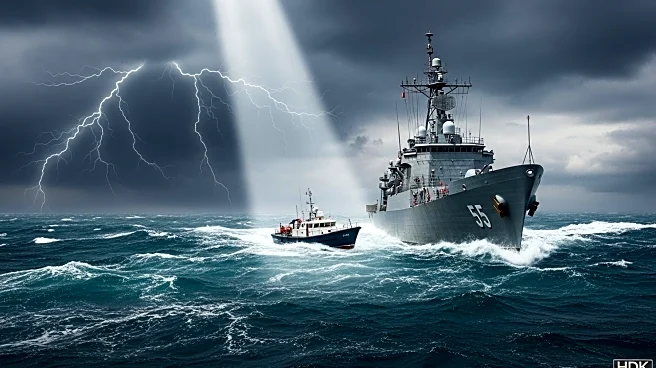What's Happening?
The Israeli military has intercepted the final boat in an aid flotilla attempting to breach the naval blockade of Gaza. This action follows the interception of other vessels and the detention of approximately 450 activists, including Swedish campaigner Greta Thunberg. The flotilla, known as the Global Sumud Flotilla, aimed to deliver humanitarian aid and challenge Israel's blockade, which has been in place for nearly two years following Hamas' attacks on October 7, 2023. The Israeli navy took control of the last ship, the Marinette, and detained those aboard, leading the vessel to Ashdod port. Israeli officials have labeled the mission a stunt, warning the flotilla of its approach to an active combat zone and offering to transfer aid to Gaza. Pro-Palestinian demonstrations have erupted globally in response to the flotilla's interception.
Why It's Important?
The interception of the aid flotilla highlights the ongoing tensions surrounding the blockade of Gaza and the broader conflict between Israel and Hamas. The blockade has been a point of international contention, with accusations against Israel of human rights violations. The flotilla's interception has sparked global protests, indicating widespread disapproval of Israel's actions and the humanitarian impact of the blockade. The situation underscores the complex geopolitical dynamics in the region, with potential implications for international relations and humanitarian efforts. The deportation of activists further complicates diplomatic relations and raises questions about freedom of expression and the right to protest.
What's Next?
Israel is in the process of deporting the detained activists, aiming to conclude the procedure swiftly. The international community may continue to pressure Israel regarding its blockade and military actions in Gaza. The situation could lead to further diplomatic discussions or interventions, particularly from countries with vested interests in Middle Eastern stability. The ongoing protests may influence public opinion and policy decisions in various countries, potentially affecting international support for either side of the conflict.
Beyond the Headlines
The interception of the flotilla raises ethical questions about the balance between national security and humanitarian needs. The labeling of activists as 'terrorists' by Israeli officials could have long-term implications for civil society movements and their ability to operate in conflict zones. The situation also highlights the role of international activism in shaping narratives and influencing policy in geopolitical conflicts.










